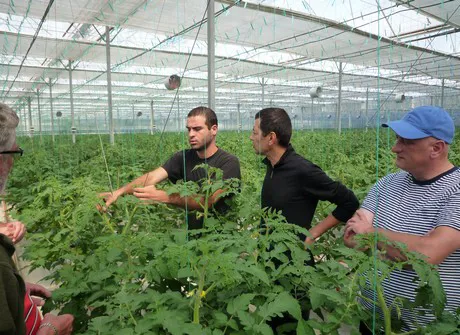"There is definitely no lack in consultants in horticulture currently, but when it comes to growers who want to start a project, supervise and take responsibility for it, there is a definite shortage." This is observed by Jan Vrins from Bilancia. It is a dangerous development, he says. “As foreign projects come to a standstill, the investment does as well. It damages the whole Dutch industry”
Jan Vrins observes that on an international level, there is too little attention for know-how and training. At Bilancia, Jan facilitates cultivation support for turnkey horticultural projects and trains local staff to become fully-fledged growers. “Massive greenhouses are built because investors think they will turn out to be great investments, but when crops need to be grown, they have no idea what to do because no money has been used to train and instruct growers.” This is deemed totally unnecessary. “The idea is to just hire a grower who can solve it. One that isn’t expensive and who isn’t absent often, because no one else can run the business” He compares it to buying a race car and not investing in a driver. “We have come across many projects where the investor refused to invest in know-how. The mistakes that were made have ended up costing ten times what the investment in know-how would have been. A great pity, and totally unnecessary”

From grower to consultancy
According to Jan, the most successful projects were the ones where not only a grower was hired but also where training was invested in. “So the future middle management are trained and will learn the right know-how and skills. With the right basic know-how we can retract from the project step by step. After two or three years there can be a change to consultancy, whereby a project can be visited by appointment.“
Industrial Holland
This sequence of events is not always maintained, depending on the availability of growers who want to work on location for a longer duration of time. "At present, there is definitely no lack in consultants in horticulture. But when it comes to growers who want to start a project, and begin supervising right away and take responsibility for everything, there is a huge shortage”. A shortage that looks to increase sharply. “Looking at the developments in Russia and China for example, or Kazakhstan… there are projects being built from 10 up to 200 hectares. We need to look at how we can transfer the know-how” And according to Jan, this doesn’t involve just the activities at Bilancia. ”If we don’t take this issue seriously, then the whole Dutch industry will be negatively affected. Right now, there are a lot of sales being made, but if the sold projects come to a standstill and nothing is grown, it will have a very negative impact – both for the Dutch greenhouse sector and the supply industry."
Dutch growers heading abroad
Bilancia guides experienced Dutch growers with their foreign adventures. And not everyone can do that. “You need to listen well, have a lot of patience and be flexible. If you don’t have a good understanding of foreign cultures and way of thinking, you better not start with overseas adventures. It is a simple fact that people of different cultures socialize with each other differently and deal with time and problems differently etc, then us Dutch”
If a match is found, growers will work at the company for a longer time. “5 to 6 weeks in one stretch, so they can explain thoroughly why certain decisions must be made” The grower keeps regular contact with other growers and with Dutch experts. The management at Bilancia visits each project at least twice a year for support. And this is very necessary, says Jan. “A supervising grower wanted hydrogen peroxide and vinegar acid to disinfect the greenhouse. This method has been very successful in the Netherlands, but while discussing this question with Dutch experts, we found out that the solution percentages of the substances in that particular country were very different from those in the Netherlands. This is something that you need to discover in time."
Big question
Jan is expecting that also this year there will be a huge demand for project managers, people who want to share their expertise and skills with the growers on location. At Bilancia, there are currently requests for experts in the cultivation of baby carrots, blueberries and strawberries, both inside the greenhouse and outside. In addition, we have received also three requests for setting up a horticulture training center. “One starts to understand, certainly in areas where several projects have been built, that acquiring know-how is essential, this is a huge step forward.
This transfer of know-how presents, with participation of suppliers and consultants, a rewarding challenge.”
For more information about Bilancia:
BilanciaVan Speykstraat 2
2628 RG DELFT
NEDERLAND
info@bilancia.nlwww.bilancia.nl+31 (0)6 55 72 50 75


